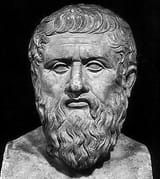Search Results
7/1/2025, 10:25:06 AM
6/22/2025, 2:34:15 AM
>>24486254
The Just State (The Ideal City/Kallipolis):
Plato believed that a just state would mirror the just individual soul, "writ large."
Three Classes: He envisioned an ideal society divided into three corresponding classes:
Philosopher-Kings (Rulers): These correspond to the rational part of the soul. They are individuals who have successfully completed the rigorous education, ascended to the knowledge of the Forms, and are thus best equipped to rule with wisdom and for the common good, not for personal gain. They rule by knowledge and reason.
Auxiliaries (Warriors/Guardians): These correspond to the spirited part of the soul. They are courageous and disciplined, responsible for defending the state and enforcing the laws made by the philosopher-kings.
Producers (Workers/Artisans): These correspond to the appetitive part of the soul. They are responsible for producing the material goods and services necessary for the state's survival.
Functional Specialization: Justice in the state, according to Plato, is achieved when each class performs its specific function diligently and does not meddle in the affairs of the other classes. This creates a harmonious, efficient, and stable society where everyone contributes according to their natural aptitude.
No Private Property for Guardians: To prevent corruption and self-interest among the ruling and auxiliary classes, Plato proposed that they should live communally, without private property or traditional family structures. This ensures their loyalty is solely to the state and the common good.
The Rule of Philosopher-Kings:
This is the most critical and distinctive element of Plato's solution. He famously states: "Until philosophers rule as kings, or those who are now called kings and leading men genuinely and adequately philosophize, that is, until political power and philosophy entirely coincide, cities will have no rest from evil... nor, I believe, will the human race."
Only those who possess true knowledge (the philosophers) are capable of understanding the Form of Justice itself and can therefore govern justly. They are motivated by wisdom and the good of the whole, not by wealth, honor, or popular opinion.
The Just State (The Ideal City/Kallipolis):
Plato believed that a just state would mirror the just individual soul, "writ large."
Three Classes: He envisioned an ideal society divided into three corresponding classes:
Philosopher-Kings (Rulers): These correspond to the rational part of the soul. They are individuals who have successfully completed the rigorous education, ascended to the knowledge of the Forms, and are thus best equipped to rule with wisdom and for the common good, not for personal gain. They rule by knowledge and reason.
Auxiliaries (Warriors/Guardians): These correspond to the spirited part of the soul. They are courageous and disciplined, responsible for defending the state and enforcing the laws made by the philosopher-kings.
Producers (Workers/Artisans): These correspond to the appetitive part of the soul. They are responsible for producing the material goods and services necessary for the state's survival.
Functional Specialization: Justice in the state, according to Plato, is achieved when each class performs its specific function diligently and does not meddle in the affairs of the other classes. This creates a harmonious, efficient, and stable society where everyone contributes according to their natural aptitude.
No Private Property for Guardians: To prevent corruption and self-interest among the ruling and auxiliary classes, Plato proposed that they should live communally, without private property or traditional family structures. This ensures their loyalty is solely to the state and the common good.
The Rule of Philosopher-Kings:
This is the most critical and distinctive element of Plato's solution. He famously states: "Until philosophers rule as kings, or those who are now called kings and leading men genuinely and adequately philosophize, that is, until political power and philosophy entirely coincide, cities will have no rest from evil... nor, I believe, will the human race."
Only those who possess true knowledge (the philosophers) are capable of understanding the Form of Justice itself and can therefore govern justly. They are motivated by wisdom and the good of the whole, not by wealth, honor, or popular opinion.
6/15/2025, 1:48:32 PM
>>24467387
Yes
Yes
6/15/2025, 3:51:25 AM
6/14/2025, 3:39:18 AM
Page 1
